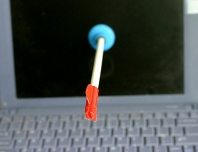Tuesday, February 8, 2011
 You can approach sharing your personal data in two ways:
You can approach sharing your personal data in two ways:
Some people absolutely refuse to use applications such as Facebook, Twitter and LinkedIn.
Others simply register with these sites in order to stop others from stealing their identity and using it to impersonate them. Other people go all out and share their whole life, successes and woes, likes and dislikes, and publish it for everyone to see.
The same goes for user profiling. Some people do not mind that their every move is being traced and companies build extended profiles on their habits, likes and dislikes whilst others have a high Big Brother feeling and absolutely avoid using most, or even any of the electronic tools we have at our disposal these days.
It is quite impossible to avoid being tracked, as every move you make on the Internet, using your fixed or mobile phone, credit and debit cards, bank transfers, purchases, driving on the highway and walking in public places, is monitored, registered, analysed, mashed up, stored and used for a multitude of purposes. Even if you do not use electronic tools yourself, the movements of your car are still registered by the numerous intelligent camera's, even your face gets recognized by surveillance cameras. Tourists take geotagged snapshots with you as accidental passerby, and Facebook puts your name to your face.
In fact, it is actually quite undesirable to have people move 'under the radar' so to speak as it opens the door to illegal, antisocial and unwanted activities and removes the feeling of social control.
The data protection law empowers us to retain control on who handles our personal data and what they can use it for. It also allows us to stop people or entities from processing our personal data if we have good reason to do so.
The benefits of user profiling are many. Instead of having to actively search for information and goods that interest us, companies can present us with relevant and interesting information and goods and not bother us with information that does not interest us. It is like the baker who knows which kind of bread you like and the tailor who knows your size and taste and helps you find the perfect garment in no time at all.
Of course, there are also possible abuses with user profiling - such as criminals knowing when people are not at home.
In conclusion, user profiling has many advantages and disadvantages, but it is here to stay and cannot be avoided.
It is up to us, the general public or data subjects as we are called in data protection law, to keep a grip on our information, to exercise our rights and to keep arming ourselves with the necessary legal arms to keep abuse at bay.
The data protection law must not be seen as restricting the use of personal data, but as a means to install trust and order between the data controller and the data subject. It leaves us with many ways to help us use personal data correctly for a long term relationship between customer and supplier.
Category: